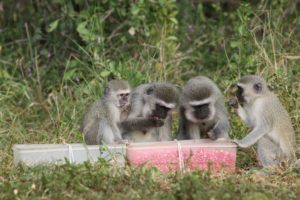 How powerful is learning from others, rather than learning oneself? To find out, we first let groups of African vervet monkeys learn to prefer a monthly corn provision dyed one colour over bitter corn dyed differently.
How powerful is learning from others, rather than learning oneself? To find out, we first let groups of African vervet monkeys learn to prefer a monthly corn provision dyed one colour over bitter corn dyed differently.
When a cohort of infants later began to try solid food we reintroduced both colours of corn without any bitterness. Social learning was so powerful for these infants, 26/27 first ate only the local colour their mother preferred.
More striking was the behaviour of immigrant males who transferred from ‘eat pink’ groups to ‘eat blue’ or vice versa. All but one followed the rule “When in Rome …” and switched to the new local preference [1]. Such conformity seems surprising, but other of our recent results with chimpanzees is consistent with such effects [2]. Can you suggest a hypothesis for why the migrant males act as they do?
Interactive details (now online).
New York Times Article and Video (March 2014)
New York Times Article and Video (March 2013)
[1] E. van de Waal, C. Borgeaud, & A. Whiten. ‘Potent social learning and conformity shape a wild primate’s foraging decisions’. Science, 6131, 483-5.
[2] Price, E E., Lambeth, S. P., Schapiro, S. J. & Whiten, A. (2009). A potent effect of observational learning on chimpanzee tool construction. Proc. R. Soc. B, 276, 3377-3383